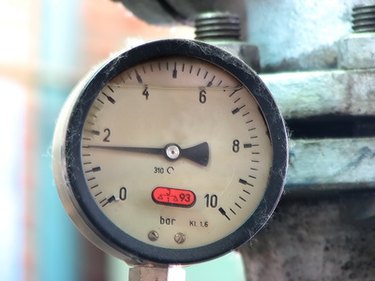
Although widely used in a huge variety of construction, entertainment, personal and professional tasks, air compressors aren't without their share of danger potential. Air compressors commonly found in both professional and domestic settings have a variety of factors that can cause them to fail structurally, causing a powerful and potentially lethal explosion of shrapnel.
Rust
Video of the Day
If the tank is not drained daily, liquid can accumulate in the bottom of the tank over time. This liquid can corrode the bottom interior of the tank, eventually leading to the air pressure inside rupturing the weakened metal and causing an explosion.
Video of the Day
Exceeding the Labled Pressure Rating
If the tank is over-pressurized, a number of things could occur. The valve for release and/or intake could fail, the air pressure could cause a failure of moisture-weakened metal as mentioned above or a minute pinhole of metal fatigue could become a stress release point and cause an explosion.
Regardless of the means, the end result is a dangerous blast of sharp metal shards flying in every direction.
Overheating the Compressor
If the air compressor is located in an area that exceeds the optimum temperature for storing said compressor (a rating that is always spelled out on the tank's safety guidelines sticker), the result could be a failure of the valve, metal fatigue,or just general over-pressurization of the internal air supply, causing an explosion.
Accidental Puncture
Air compressors tend to be used around work zones, construction sites and other areas where the chances of sharp-force trauma to the tank's pressurized parts are all too likely.
If the air compressor is punctured even a little while working at peak capacity (or near to), the result would be an immediate, explosive release of all pressurized air through the puncture mark, potentially ripping apart the tank completely and sending dangerous metal shards through the air.
Unfiltered Air
If the air being fed into the compressor contains abrasive particulates and isn't filtered properly, those same particulates can wear down the compressor's pistons and other moving parts.
While the most likely outcome will simply be an eventual shutdown of the machine, there's a possibility that pistons grinding away against other parts with friction-generating materials in their lubricating oil could create enough heat to over-pressurize the tank and cause an explosion.